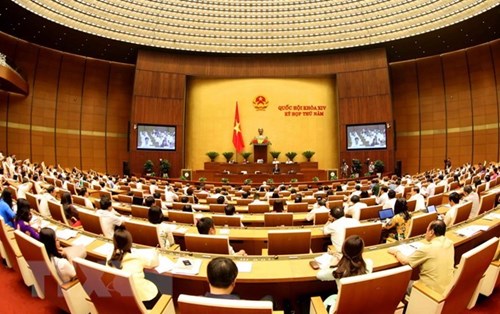Four ministers were grilled during the live-broadcast question period, who were Minister of Transport Nguyen Van The, Minister of Natural Resources and Environment Tran Hong Ha, Minister of Labor, Invalids and Social Affairs Dao Ngoc Dung, and Minister of Education and Training Phung Xuan Nha.
Deputy Prime Ministers Trinh Dinh Dung and Vu Duc Dam, along with several other ministers and sector leaders, also joined in the Q&A to give further information and explanations on issues raised during the questioning.
    |
 |
|
The National Assembly completed the three-day question period on the afternoon of June 6. |
The Q&A sessions focused on four main groups of issues of great concern of voters and people nationwide.
The Minister of Transport was asked about measures to improve transport infrastructure, ensure traffic safety, especially in big cities, and solve outstanding problems related to BOT projects.
Meanwhile, questions put to the Minister of Natural Resources and Environment focused on land management in big cities and localities with large numbers of complaints and denunciations, environmental pollution and the management of waste discharge by enterprises, and measures to respond to climate change particularly in the Mekong Delta.
The Minister of Labor, Invalids and Social Affairs was required to talk about the labor market, vocational training and measures to address violence and abuse of children.
The Minister of Education and Training answered questions mainly on how to improve quality of general and higher education, the management of preschool education, especially private kindergartens.
Deputy PM Vuong Dinh Hue presented an updated report on the socio-economic situation in May and the first five months of 2018 and answered questions from NA deputies on related issues.
Most NA deputies appreciated the effect of the new rule under which each NA deputy has one minute to raise questions, and after three questions, the asked Cabinet member has three minutes to make the answers. They said the change facilitated dialogue and face-to-face debate, allowed more deputies to raise their opinions while preventing overlapping questions. Meanwhile, the questioned Cabinet members must make thorough preparations in order to give satisfactory answers.
During the three days of Q&A, more than 200 NA deputies registered their questions or joined in the debate, and some of the questions have to wait for answers in written forms due to a shortage of time.
Many interviewed voters said the change in questioning style allowed NA deputies to better perform their role as representatives of the people and convey more wishes and aspirations from the public at the parliamentary forum.
Source: VNA